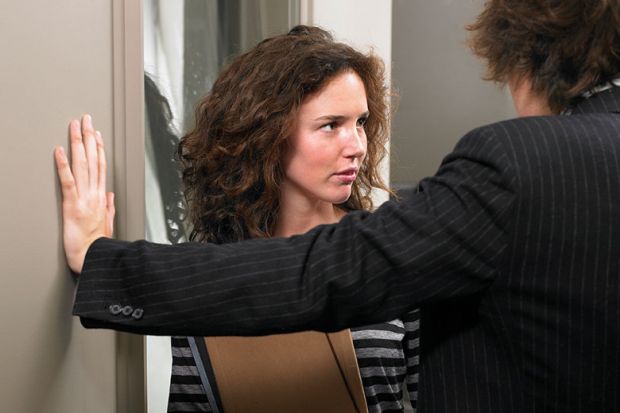Universities have been urged to prohibit sex between teaching staff and students after an investigation revealed that only one in 20 in England and Wales explicitly prohibits it.
A survey of 102 institutions conducted for a new book on sexual abuse in higher education found that 51 simply discouraged such relationships, and 45 gave no guidance at all.
Only six – Lancaster, Leeds and Nottingham Trent universities, the universities of Greenwich and Roehampton, and UCL – explicitly forbade them.
Authors Eva Tutchell and John Edmonds argue that the widespread lack of prohibition is “seriously at odds” with universities’ responsibility to protect students’ interests.
In their book Unsafe Spaces: Ending Sexual Abuse in Universities, they say that managers often argue that it is wrong for institutions to get involved in the private lives of staff and students, that adult students are entitled to make their own decisions, and that a ban would be unenforceable and would drive such behaviour underground.
However, the pair write, “almost every such relationship ends by hurting the student”.
“It also disrupts the smooth running of courses, feeds a suspicion of favouritism which weakens faith in the assessment process and leaves a residue of disharmony and cynicism which persists well beyond the end of the affair,” they say.
Ms Tutchell, an education consultant, and Mr Edmonds, a visiting academic at King’s College London and Durham University, question whether such a sexual relationship can ever be genuinely consensual given the potential abuse of power involved and highlight that the academics involved are often “serial predators”.
In their book, due to be published, on 24 September, the pair warn that sexual harassment is “rife” across English and Welsh universities. Building on past surveys and expert interviews, they estimate that a minimum of 15 per cent of female students and about 3 per cent of male students have been abused, claiming this would mean that at least 50,000 students are sexually abused each year.
Their survey of institutions also examined complaint procedures in cases of alleged misconduct, and found widespread disparity in their effectiveness.
Almost a third of institutions (32) had “made few changes in the recent past and show no obvious sign of giving a high priority to sexual harassment and abuse”, they write. Most – 61 – had introduced some new initiatives, but they identified only nine that had fundamentally shifted towards a more professional and evidence-based approach.
Ms Tutchell and Mr Edmonds say that these are the universities of Cambridge, Oxford and Sussex; Keele, Durham and Lancaster universities; and three London institutions: Goldsmiths, University of London, Imperial College London, and the London School of Economics.
The authors note that a number of them, such as Durham, Keele and Sussex, are institutions that have experienced sex scandals in the recent past, suggesting “that the damaging publicity acted as a wake-up call to those universities”.
The authors call for a “major programme of reform” to tackle sexual harassment in institutions. They call for universities to undertake a detailed survey to establish the full extent of the problem and for vice-chancellors to meet with and hear the experiences of those who have suffered from abuse.
“For those not named for their good practice in the book, if they don’t make vast improvements, and quickly, a scandal is on the horizon,” Mr Edmonds told Times Higher Education. “I can’t predict who will be next, but there are about 20 I could guess based on their procedures.”




